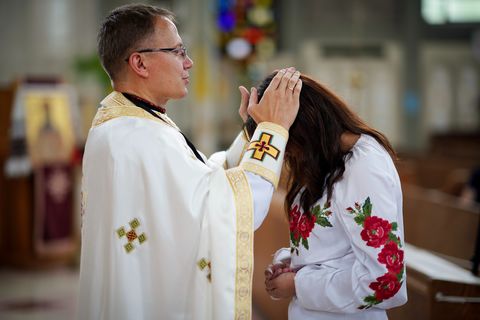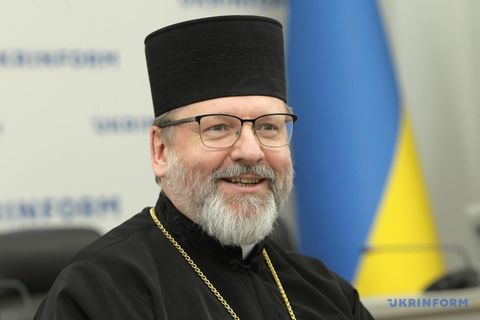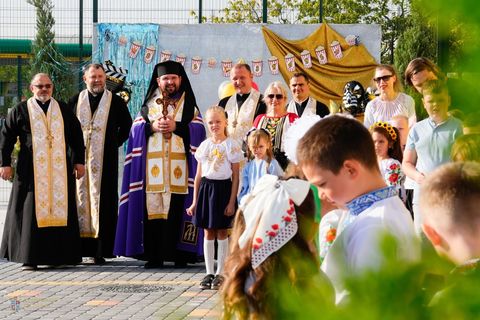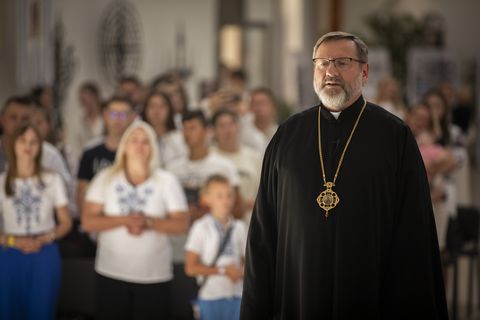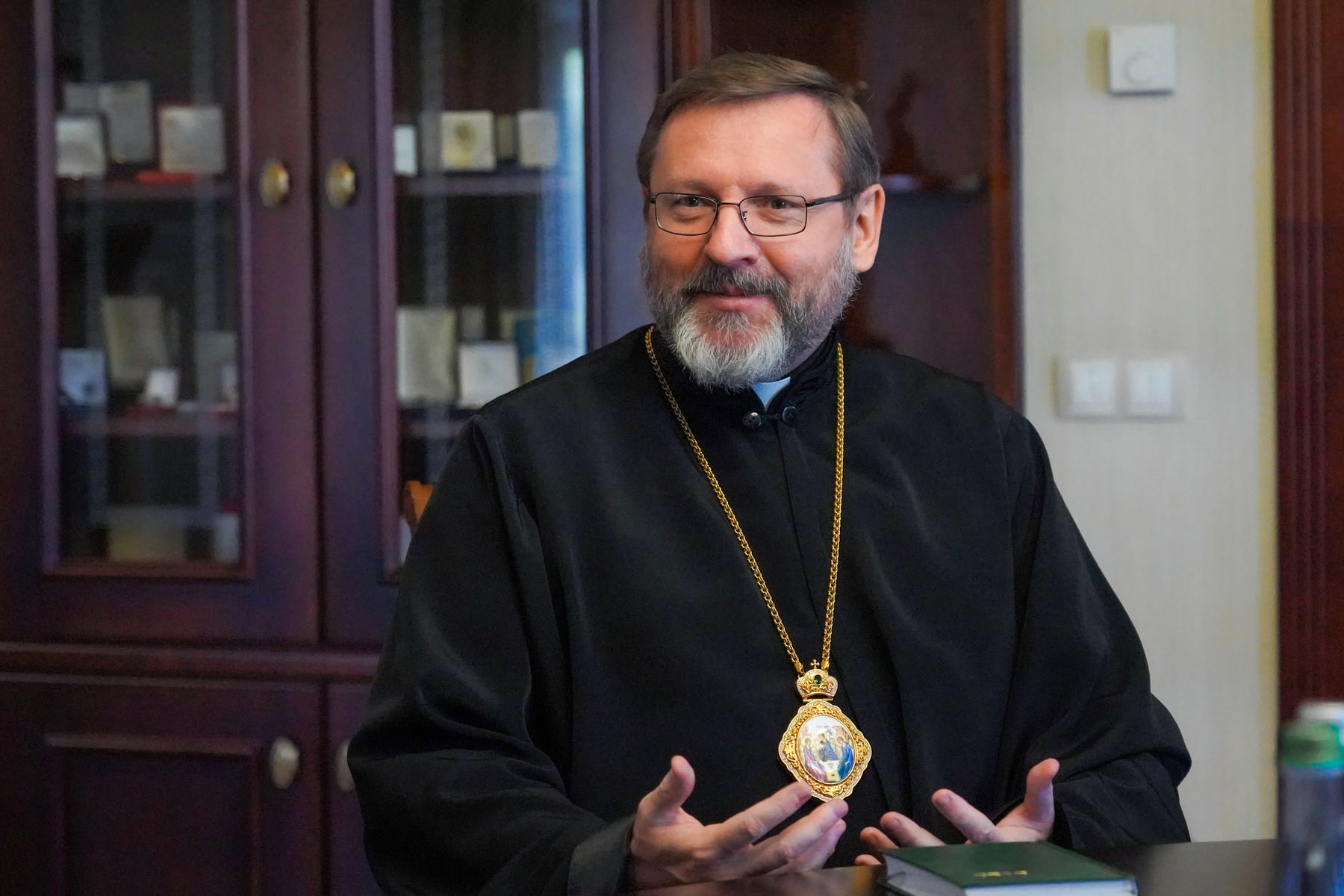
“The Lord is passing through Ukraine. His presence changes history”: interview with His Beatitude Sviatoslav for the Croatian “Glas Koncila”
Father and head of the Ukrainian Greek Catholic Church, His Beatitude Sviatoslav, speaks about the nearly 400 days of Ukrainian Lent in an interview with the Croatian Catholic edition “Glas Koncila” from wounded Ukraine.
— Since the first day of the full-scale war, your video messages have been reaching the Croatian public and believers every day: insights about the situation in the war-affected area, testimonies of courage… How difficult is it to send messages of encouragement and spiritual stimulus to the suffering people, priests and soldiers every day?
— Well, those messages were constantly changing. Originally, in the very beginning of the war I felt that I had to say something publicly because everyone was scared. The situation was uncertain and we were the major target here in Kyiv. I would say that the first existential need for such video message was simply to show that we are alive, that we are here, we are staying to be the voice of the Church from an almost surrounded capital of Ukraine. Secondly, as I had the same feeling as our people inside and outside of Ukraine, I realized that the voice of head of the Church was a voice of the mother Church. Not only did I have an informative task, I also had a pastoral one. I used to repeat several times, in the last few months, a single story which I experienced with the people of Zhytomyr, a city near the frontline. One Saturday, very similar to today’s situation, 21 missiles hit that city. I immediately went to visit that city. There, I met an old woman, who told me: “Your Beatitude, we are scared to death. We live in a state of great fear but thank you for your daily messages, thank you for talking to us.” I was a little bit discouraged when I learned how she felt. I told her: “I don’t know what I should say to you”. She replied: “It does not matter what you say. What is important is that you’re talking to us. Because that voice of the mother Church is so important to overcome our great fear.” This motivated me, and I started to prepare daily reflections on the Christian way to approach this situation of fear, pain, and the of the resilience of the Ukrainian people in such circumstances.
— But there is also one more reason. In that videos you try to reflect what it means to be a Christian in the midst of war…
— Yes, I understood that there is a serious question. Is it possible to believe in God’s love when witnessing such atrocities each day? I started to reflect and made me rethink all the Christian teaching. It was some sort of catechesis in the midst of the atrocities of war. I understood it as a very important means of evangelization. It is not only that we show up, that we’re alive, not only the voice of pastoral care to those that are wounded but also a proclamation of the Gospel of Jesus Christ in the midst of the war. We also are experience that the war is a moment of major conversion of hearts. People are starting to pose difficult questions. Why is this happening to me? Does God care about us? Where is he? Is he with us? Should we surrender? Those are existential questions which nobody can answer. We can figure out the answers by listening to the voice of the Word of God. It was daily meditation on the word of the God, daily meditation on the basic truth of the Christian Faith but also a great moment of evangelization. We were a small light of hope in the midst of the darkness of the disaster of war in Ukraine.
— When you were talking about the catechetical dimension of your video messages it is known terms “just war” in social teaching. So, what does it look like in practice?
— I have been teaching the social teaching of the Church for many years, I was the professor of moral theology in the Catholic university and in the seminary in Georgia. The whole issue of war and peace is an integral part of the social teaching of the Church. But when I stood on the mass grave in Bucha and I saw those killed people, bodies in these mass graves, it was the moment I had to rethink everything that I knew about the social teaching of the Church. Let me share with you some reflections. So first of all, the social teaching of the Church is based not on human philosophy, but on our Christian religious foundations. So, we can speak about the social teaching of the Church because we believe in God. Religious foundations of the social teaching of Church are the most important statement. For the Christians, social teaching is the social manifestation of love of neighbor. This whole issue of a just war in such conditions is a contradiction in itself. It is why I fully share with the Catholic Church this statement: in the conditions of today’s war, with highly-developed weapons of mass destruction, of a hybrid war fought not only with arms but also with disinformation, economy, and even with diplomacy, we have to rethink the whole concept of the justice amidst that war. And, we also have to emphasize the primacy of defending of the human life. We used to say that, even for self-defense, we have to use the same category of moral judgement for using weapons as in the case of just self-defense in normal circumstances. As to the issue of proportionality, the use of weapons should be considered. But first of all, we have to profess the dignity of human person. We have to protect human life and possess the right to protect it.
— Is it possible to protect human life in Ukraine without weapons?
— This is a major question. Many pacifists will say: no weapons please, but I have to be realistic. Is it possible to stop Russian aggression right now without weapons? So far, it is impossible. Was the use of weapons proportional? I think we could make such statement only after the war’s conclusion. But right now, we have to protect human life and we, as the Church in our social commitment, in our parishes which became a center of social services, we are implementing the social teaching of the Church. We are sharing love and care for the victims of this war.
— In the mystery of Lent, how do you view the current situation in Ukraine?
— Let me share some spiritual reflections arising from the war. Where is God when we are killed each day? As Christians we have a unique answer. We have an image of our Savior, our Lord Jesus Christ who became man. We can confess that, among those killed in the mass graves, our Lord Jesus Christ was killed. When venerating those bodies, I was venerating my Lord who is willing to accept our pain during war. Each day we have to pay our homage to human suffering, to the wounds of the people. And I’m not ashamed of the wounds because those wounds are the wounds of Jesus Christ. He is wounded amidst us. Where is God? He is among those who have to leave their homes, He Himself is becoming homeless with those families who are now considered as internally displaced people or refuges. Serving them, we pay service, homage, respect, we celebrate our honoring Jesus Christ in his pain, in his wounds among Ukrainian people. This is why I have to say that, even the social action of the Church is based on our vision of God’s presence among us. Today, especially in the time of Great Lent, we are honoring the crucified Lord. We are venerating his sufferings for the sake of humanity. Yet, I must say that, today, Christ is crucified in the body of crucified Ukraine.
— Thank you for the testimony that disaster gives rise to the awareness that all trust is in God’s hands. So, could you say that feeling is shared also with your believers?
— Absolutely. We as Christians believe that Paschal mystery is not completed at the moment of the crucifixion. We have to continue toward resurrection. If we are crucified with Christ, we will rise with him. So, we do have a hope in Ukraine in the midst of war because we do believe in resurrection. We do believe in the Risen Christ, and Pascha means that the Lord is walking through Ukraine, He is walking among us, He is walking with us and His presence changes history. That is our Paschal pilgrimage which we began a year ago. Many people in Ukraine would say that we have been going through Great Lent not just for 40 days but more than a year. Perhaps it is a mere coincidence that, last year, the full-scale war began at the beginning of the Great Lent. We still have the feeling that we are moving toward the joy of resurrection. We do have this hope because we are the nation that believes in Risen Lord.
— An important station of the Lenten journey is the personal questioning whether more can be done. Do the remaining — often tired and stressed-out priests because they too are often targeted by Russian forces and are arrested and forced to leave the area where they operated — succeed in being a sign of hope for their people?
— As a bishop, I am obligated to take particular care of priests, nuns and members of religious orders. I must say that consecrated persons who experienced the atrocities of Russian occupation, including torture, they all said that, in the very painful moment of that experience, they all felt that is was the most powerful experience of the God’s presence. The reason for this is that, the source of our resilience it is not human capabilities and wisdom, but rather God’s presence. They were able to survive without any human expectations because they were convinced that the source of their life, God Himself, was with them. Also, it is their particular mission is to manifest that source of life. We do not preach ourselves or our heroism because we are sinners. Rather, a Christian’s duty today is to reveal the face of God present here. We thus manifest God by sharing the life’s sorrows with those who are in pain, who are wounded, who despair, who live in fear. I would say that, to point out this source of life among us is the mystical experience of those among our priests who endured the worst tragedies of war.
— In many parts of your country, people are suffering from the horrors of war and we are witnessing a strong humanitarian crisis. Is the spirit of the Ukrainian people breaking under the “crossroads” of bombings, destruction of cities, death that you are facing every day — the events that you have been going through for the past year?
— I often have feelings of great admiration for my people, which is a form of Christian contemplation. You can really be amazed at how, each day, people are restoring electricity, the water supply, and the things which allow people to survive in the big cities. When they repair things, they are aware that the Russians will strike again, and they will repair them again. They will not be disappointed give way to despair, thinking that their mission has meaning. Even more so, this faith that life will prevail over destruction is fueling Ukrainian resilience today. It is a feeling that extends beyond the boundaries of any specific confession. The reason is that it is the common feeling among all of Ukrainian society, including Catholics, Orthodox, Protestants. It is why I very often said that our common experience is having the experience of Paschal joy, even amidst of the pain and destruction which we’re facing each day. We will repair Ukraine, we will rebuild our cites, we will heal our wounds. Why? Because Christ is risen.
— I have heard information that a large portion of Ukrainian territory is without pastoral care because of the war. How difficult is it for you?
— In the zones currently occupied by the Russians, Donbas, the southern part of Zaporizhia, Crimea, is almost impossible for Catholic priests to perform their duties. The reason is that the only manifestation of religious life allowed in those territories is the Russian Orthodox Church. Catholics, Protestants, Jews, and Muslims are considered dangerous and are targeted by the Russian forces. Yet, the Church does not only consist in the Church structure and clergy. If somebody asked me, is your Church present in the occupied territory, I would say — of course, because our people are present there, our communities, our parishes are there, even without priests. When priests in Mariupol suspected that arrest was imminent, they taught their people how to live their religious and parish life without a priest. We know that right now those people are gathering on Sunday for common prayer, they are attempting to follow our Liturgy online, to listen to the voice of the Church, using ever means. But the parish is alive because the community is alive. Often, it is dangerous to gather in the church, so they meet in their houses. This situation reminds me of the underground Church in the Soviet times. It was the Church in which I grew up, and more so my family. So, the Church does exist, but now our duty is to consider how to provide pastoral care to those people. Very often, we hear discussions on peace proposals for Ukraine and whether the occupied territories should be liberated or ceded to Russia to stop the military attacks? My heart bleeds when I hear such questions. Please do not consider these territories in abstract. My heart bleeds for my faithful, who cry out to God each day begging for the return of the Eucharist. They are supposed to be heard, they are supposed to be liberated, they are supposed to have the right to live, not merely survive, but to live in dignity, also according to their Christian faith.
— On the other hand, in the territories who are not occupied, parishes are centers of help. How do you see their role now amidst the war?
— It is not easy to describe because there are so many different dimensions. In Christian spirituality, we often use the expression “sacrament of Presence.” The presence of a parish community with its priest and united to the bishop is like a sacrament of presence, which can have different dimensions. Of course, social service is one dimension of this sacrament of presence. Thanks to worldwide solidarity, we are now able to provide logistic for the transportation of humanitarian aid. We also can offer the possibility of assistance to those who need to be evacuated. Also, our parish communities are centers of medical care and psychological counselling. Very often we provide shelter to those who lost their homes. But the most important is the presence of pastoral care for everyone without discrimination. Whether you are Catholic, Christian or not, if you need human assistance, you will receive it. I always emphasized that, before we can offer humanitarian aid, we have to offer human assistance and be human amidst these inhuman atrocities of war. Also, we can provide other kinds of assistance that are found in human relationships. Very often people need to be reintegrated into social life. They have to socialize in order to find a job in new location. They are seeking to reintegrate their children to the school system, to access medical assistance. Our parishes very often are not only door to the supernatural world but also the door to socialization of internally displaced persons into a new social context. Thus, we have to emphasize that this Sacrament of Presence has many different manifestations. Only after the war is over will we be able to reflect and discover the whole picture of that presence, and only then will we have a complete response to your question.
— Do you feel sufficient empathy, closeness to the Ukrainian people compared to other nations? Are you satisfied with the way believers from other European countries reacted to the war in Ukraine?
— First of all, let me take this opportunity to thank the people of Croatia and Catholics worldwide for solidarity, outstanding help, cooperation, and the humanitarian aid offered to the Ukrainian people during this last year of war. We have had to deal with the largest humanitarian crisis in the Europe after the end of Second World War, almost 20 million Ukrainians were displaced from their homes. As Christians, we were able to prevent a human catastrophe, to which this human crisis did not deteriorate. At least in this territory, which is controlled by the Ukrainian troops, no one died of hunger, thirst or cold, even during this most difficult winter of Ukrainian history. This was thanks to social assistance, worldwide solidarity and humanitarian aid to Ukraine. But we are all human and it is human to be tired. Often, there is tiredness not only inside but also outside of Ukraine. So, my plea to you is, do not tire. For the secret of our victory, not only over Russian aggression but also the victory of good over evil, the victory of life over death, is the secret of endurance. We must endure to offer our love and assistance to victims of this war. Please do not get tired. Even if the war in Ukraine is not headline in the daily newspapers, please be aware that suffering and trauma in Ukraine continue to grow. Please do not give up on Ukraine, please do not give up your capacity to be empathic with those who still suffer in Ukraine.
— Besides the struggle for their own lives, what are Ukrainians most afraid of these days?
— We are afraid to be abandoned, for the world would forget us. What if it was ashamed of the wounds of the crucified Ukraine, and if we were abandoned to face pain on our own? That would be the most terrible situation for us because isolation amidst suffering is a hell. That will be biggest disaster, not only for human being as such but also for Christian Church and the credibility of the Gospel of Jesus Christ in today’s world. People very often would look in my eyes, when I’m delivering humanitarian aid, and ask me: “Will you stay with us or is your aid is sporadic? Are you going to give us this box and then abandon us?” My answer and answer of our Church is: “No, we will stay together, we will walk together until the end. You will not be abandoned.” That is the biggest fear of Ukraine, but as a Catholic I have good news in response to that fear: you will not be abandoned.
— The Greek Catholic Church in Croatia, the Eparchy of Križevci, established a pastoral mission to provide pastoral and spiritual care for people displaced by the war in Ukraine throughout Croatia. What is your message to your believers who are outside of Ukraine?
— My message to the Greek Catholics from Ukraine is to remain true to yourself, be witnesses of your crucified nation. Please remain human and remain Christians. Our message about the pastoral care of displaced people is the following: integration but not assimilation. Secondly, we have much to give but not only to receive. The presence of Ukrainian refugees in different countries is not one which merely requires constant assistance. Ukrainians can contribute, and not only to the development of your economy. Part of our dignity is to be able to help ourselves and not to be dependent on your assistance. The refugees need advice on how to be integrated in your society, to get a job, to be able to contribute to the common good of the country where they are staying. But also, they can share their Christian faith and heritage with you. The Christian experience of our faith is a treasure. I would invite Croatian Catholics to share the treasure of faith of the many refugees which are currently in your country. Please listen to them, the Ukrainian language is very close to Croatian and they will learn Croatian very easily. Please encourage them to speak out. Create special communities and places of listening in your parishes, for they bring the pain in their heart and need to express that pain. They need somebody to listen to and they will share their personal stories, their personal Christian experiences and those stories will enrich you and also help you remain Christian in the secularized world of the European Union. Thus, we can share our gifts, not only give but also receive, not only receive but also give.
— How do you prepare to celebrate the second Easter in the midst of war?
— It is a special feeling to celebrate Easter in wartime. I remember Easter last year; it was a joy such as I have never before experienced in my life. Last year at Easter, we were liberated here in Kyiv. Russian troops had withdrawn from the area near of Kyiv, we were feeling that joy of victory. For us, the message of Christ’s Pasha was the message of victory. This year, we will have different expectations in a different situation. But definitely joy will come, and life will overcome death. I think this will be the enduring message of Easter: Christ is risen, and He will come among us not only crucified and buried but also Risen Lord. And this will renew our capacity to withstand, to go continue, to remain ourselves, to be free, to be Christians.
— Do you even see, at this moment of time, a path to an end to the conflict? Is it possible and in what way?
— Miracles happen. Humanly speaking, I would say, there is no visible security or insurance that things will be dramatically different. There are some expectations that perhaps the culmination of the conflict will have already occurred. There are some expectations of the capacity of Ukrainians troop to liberate the new territories. I don’t know because I’m not a general of the Ukrainian army. I’m not politician so I don’t have such information in order to form a perspective with expectations. I’m just a bishop, just a Christian. I remember the feeling I had when Soviet Union collapsed. It was a monster which was blackmailing the entire world with its nuclear power. Then, this monster collapsed in a moment and we had a feeling it happened, not by human hands, but by the mysterious providence of God. I have a feeling and some expectation that Russia will face very similar story. Right now, it seems to be a powerful nuclear state which is blackmailing entire world with its pride, disregarding human rights and international law. It could collapse in a single moment. When? We don’t know. But we are moving toward Easter, and we are Christians and we have an experience that miracles happen.
— Such an extraordinary situation is not unknown to you personally, because you yourself grew up in the environment of changing political situations, you studied in an underground seminary, you knew priests who lost their lives because of their loyalty to Christ and his Church. Do you feel that all those events have prepared you for this today?
— A few days ago, we started our annual retreat for the clergy of my archeparchy. I was looking into the eyes of my priests. Many of them had experienced occupation and liberation. They had remained in he occupied territory and now they’re in a situation of liberation. In their eyes, I had this impression: perhaps the entire 30 years of the development, the rebuilding of our Church structures, the creation of new eparchies, new parishes were a great preparation for these tragic days. God gave us the possibility to endure in advance. God was preparing us for this moment, so that we would be able to provide social assistance, pastoral care in Kharkiv, Kherson and the most difficult places in Ukraine right now. It is not by chance but indeed is according to mysterious providence of God. When the war began, especially those who remember the experience of the underground existence of the Church, we felt immediately that there was a major similarity between Soviets and today’s Russians. I asked the Lord, why did you do this to us, why did you raise us up after the fall of Communism? Was it a joke? Why did you gave us this desire, this taste of freedom, in order to take it away again? Then I discovered the answer: The Lord gave us a mission. We are within His eternal providence, and it is God’s wisdom, hagia Sophia, which rules the world. And we are part of that divine wisdom. We are included in the divine project for the world, for Europe, for the Universal Church, we are part of His project for each of us. There is a mission to do and there is also my question. Lord why did you allow me to survive here in Kyiv? I was in the list of the people to be killed if Russian would overtake the city. Why have you granted me a new day, a new year to live and serve? The answer is same: There is a mission for us to carry out. We have to bear witness for today’s world, today’s Christian world and today’s humanity.
— The “neutrality” of the Holy See and Pope Francis in choosing sides in this war causes different reactions, but on the other hand, it opens up the possibility of mediation. How do you work with the pope Francis?
— In order to be clear in your response I would like to make a distinction between the diplomatic service of the Holy See, as supreme arbiter between nations and the Churches. This diplomacy must, almost always, be above conflicts, in order to be able to be the last point of resolution to those conflicts as a supreme mediator, as a supreme servant for peace in the world. In that framework, the Holy Father should be equally distanced from both sides yet also equally close to both, to in order to understand, mediate, and serve. I have to say that such neutrality of the Holy See is not very accepted in Ukraine, right now. Everyone is expecting that the Holy Father will condemn the aggressor. But, as Catholics, we constantly have to explain to our Orthodox brethren and other Christians and ordinary citizens of Ukraine: let the Holy Father to perform his duty as supreme arbiter, because we can also benefit from his position as mediator. Actually, because of this mediation, thousand prisoners of war were released. So, we benefited from this service of supreme mediator. Yet, there is another dimension of his services. He is a Father of our Church, as Supreme Pastor of the Church of Christ. So, in that ministry, the Holy Father is very empathic with Ukraine. He wrote an open letter to the Ukrainian nation. Historically, it’s an outstanding gesture. There are not many nations in the world that can claim that the Pope wrote a special letter to their nation. The Holy Father was so empathetic with the suffering of various groups of Ukrainians — youth, refugees, children, women, the elderly. I have to say that, in that way, the Holy Father is close to Ukraine and he is with us. And even more so, he is with us even when he speaks about Ukraine. He speaks not only to Ukrainians or to Russians, he speaks in behalf of us to the whole world. And we were able, during this first dramatic year of war, to withstand the humanitarian crisis because of the constant voice of the Holy Father. At each general audience, he touches upon the consequences of the war, not only for Europeans but for all of Europe, asking prayers for Ukraine, and not to forget the silenced people of Ukraine. The Holy Father has been acting on behalf of suffering Ukraine.
Ivan Tašev for “Glas Koncila”